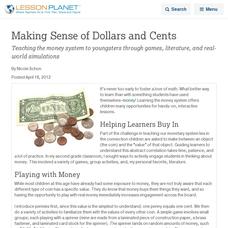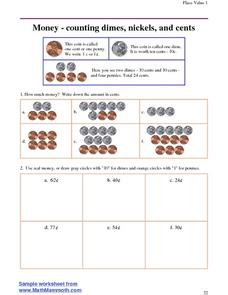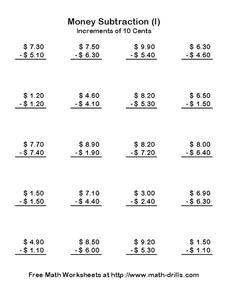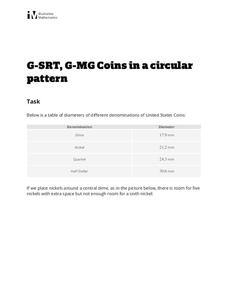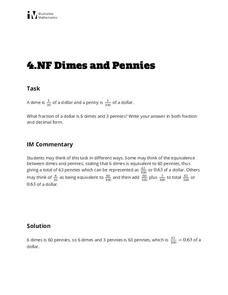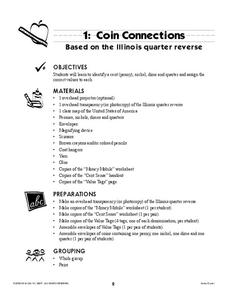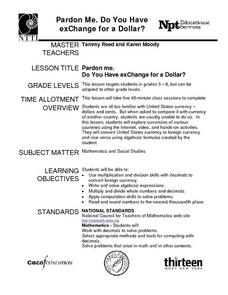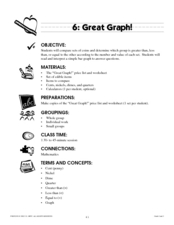Constitutional Rights Foundation
Elections, Money, and the First Amendment
Those who spend the most, win. Academics read informational text, participate in group discussion, and defend campaign reforms to understand the correlation between money, the First Amendment, and election results. The resource explains...
Illustrative Mathematics
Margie Buys Apples
One of the most common, everyday applications of math is dealing with money. This single problem calculating how much change Margie receives is more involved than it appears at first glance. An understanding of how fractions and decimals...
Curated OER
Money Is What Money Does
Everybody loves to discuss money. Using this money-related resource learners read background information, and discuss how well certain items would perform as a medium of exchange based on the function of money.
Eduplace
Challenge: Find the Value
This assignment makes a lot of cents! Learners write the multiplication equation to figure out what the amount of nickels are worth and then find the value. They complete three problems and one short-answer problem. An answer key follows...
EngageNY
Using Expected Values to Compare Strategies
Discover how mathematics can be useful in comparing strategies. Scholars develop probability distributions for situations and calculate expected value. They use their results to identify the best strategy for the situation.
Curated OER
Making Sense of Dollars and Cents
Teaching the money system to youngsters through games, literature, and real-world simulations
Curated OER
Saving Money
After listening to the wonderful book, A Chair for my Mother, young mathematicians engage in an awesome lesson about coins and the value of saving money. The lesson is done in a classic style - everything is beautifully organized, and...
Curated OER
Money - counting dimes, nickels, and cents
In this counting dimes, nickels, and pennies learning exercise, students review pictures of coins with their values, count money and write the total amounts, and use real money to show given amounts of change. Students write twelve answers.
Curated OER
The Role of Money
Fourth graders examine the role of money. In this money lesson, 4th graders read a chapter from Judy Blume's, Double Fudge, to see how money is made and how people make money. They finish a worksheet, and play a game about money.
Curated OER
Right on the Money
Students are introduced to coins and bills in American currency. After watching a video, they practice making the same amount of money out of different combinations of coins and bills. Using the internet, they discover how much each...
Curated OER
Undercurrents Of Currency
Students investigate the currencies used by different countries, and explore the principles of currency trading by exchanging currencies at current market rates. They, in groups, access websites which give them current rates.
Curated OER
Money Subtraction
For this money subtraction worksheet, students have to subtract different amounts of money where there is a dollar and cent value. Students have 20 problems to complete in this subtraction worksheet.
101 Questions
Money Duck
A video presentation shows duck-shaped soap that has a $1, $5, $10, $20, or $50 bill in its center. Learners consider different population distribution of the bills to determine a reasonable price for the duck.
Illustrative Mathematics
Coins in a Circular Pattern
What starts as a basic question of division and remainders quickly turns abstract in this question of related ratios and radii. The class works to surround a central coin with coins of the same and different values, then develops a...
Illustrative Mathematics
Dimes and Pennies
Help your fourth graders make cents out of fractions and decimals with this short word problem. After learning that dimes are one-tenth and pennies one-hundredth of a dollar, students write a fraction and decimal for a given number of...
Curated OER
Comparing Values: Comparisons Between Musical Notation and Money
Students identify ways in which the principles and subject matter of other disciplines taught in school, specifically math, are interrelated with those of music.
Curated OER
Coin Connections
A wonderful lesson on identifying the penny, nickel, dime, and quarter awaits your young mathematicians. They engage in a multi-session lesson which allows them to practice using the values of each coin in worksheets and activities...
Curated OER
Alexander Used to Be Rich
Reading Alexander, Who Used to Be Rich Last Sunday, launches this lesson plan appropriate for children who recognize coins and have been introduced to coin values. Using addition and subtraction skills, the class tracks Alexander’s...
Curated OER
Pardon Me. Do You Have Change For a Dollar?
Upper elementary and middle school learners explore currencies from a variety of countries. They use the Internet, video, and engage in hands-on activities. They practice converting U.S. currency to foreign currency and vice versa. This...
Curated OER
Buying New Stuff
Young spenders take a look at the best ways to save and spend money. This type of financial education is lacking in schools, so implementing this lesson would be of great value to your students. Things like bank checking account fees,...
Curated OER
Great Graph!
Here is a fantastic lesson counting coins, interpreting graphs, and the concept of "greater than" and "less than." Young mathematicians utilize worksheets embedded in the plan in order to practice these concepts. The worksheets are...
Curated OER
Slowly But Surely
The US mint has created this fabulous lesson plan, which practices language arts and mathematics skills. Learners will use the provided worksheets and step-by-step instructions to experiment with different sentence structures, use...
Curated OER
Quarter, Nickel, Dime....
An engaging game called, "Quarter, Nickel, and Dime" is presented in this math lesson. Players are given an envelope with slips of paper that represent the three coins. In pairs, they play the game 18 times, and the whole class charts...
Curated OER
Match the Coins
In this recognizing the values of coins worksheet, students match the coins with their cent values. Students solve six problems.







